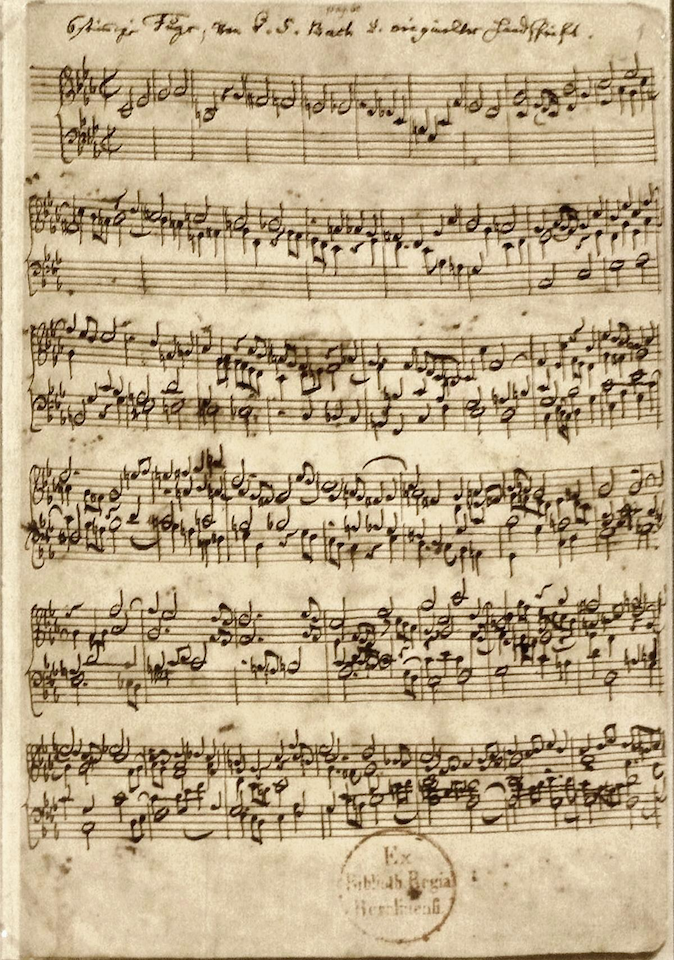
SotD: Canones Diversi

Almost a month in, and we haven’t had a visit with J.S. Bach yet. Long past time, and we’ll be back a lot too, if this series stretches out much. We’re going to start out with minimal Bach; we’ll get around to thunderous Bach, passionate Bach, and show-off Bach in later installments. Today we’ll sample from a small series entitled Canones diversi super Thema Regium, part of a larger work called Musikalisches Opfer, or in English The Musical Offering, composed in 1747, BWV 1079. Today we’ll take on the Canon a 2, per augmentationem, contrario motu and the Fuga canonica in Epidiapente. They’re not the two deepest fragments, but they’re a good place to start. This is seriously beautiful thoughtful, patient music
I could write a whole lot of words about the Offering but I don’t need to, because at least two other people have written whole books on it: James Gaines’ Evening in the Palace of Reason and of course Hofstadter’s Gödel, Escher, Bach. Gaines spends more time on the complicated relationships between Bach and his son, and on the nasty, strange King Frederick (“the Great”) of Prussia, and Hofstadter of course launches into an Extended Essay on Everything, which I enjoyed like crazy when I read it about forty years ago.
A page from Bach’s manuscript of the Offering.
I’m not going to re-tell any of the stories, except to note, sadly, that Bach didn’t get the royal-court job he was angling for with the music, and in fact there’s no evidence of it ever having been played in his lifetime.
Bach and me · Yes, rock music is closest to my heart, but in aggregate I’ve probably cared the most about Bach’s music than that of any single other. I studied the cello for years and of course the Bach suites are compulsory for every cellist. I’ve read lots of books and been to a lot of performances. You might not think you like classical music but Bach is… different. It’s at another level.
The Canones · The Offering is built around a fragment of melody that Frederick (a flautist as well as king) played for Bach. A full performance usually lasts a little over an hour. There are sixteen pieces of music, and Bach didn’t bother to say which instruments should play which lines, or what order the pieces go in. Ten of them are Canons, which is what you call a “round” when you do it around the campfire — think of successive voices coming in on Row, Row, Row, your Boat. Canons and Fugues are similar in construction. The music is contrapuntal, which is to say that at any moment there are multiple melodies in flight, dancing/interlocking together.
The Offering is about as simple as Bach gets: a small number of instruments, the music usually not very fast or very loud or very flashy. Each piece starts, makes its case, and shuts up. No cheap tricks. Which sounds austere, until you get in a room where people are playing it, and it’s not at all, it’s rich and sweet and endlessly deep.
I entirely lack the words to describe what happens in these two short pieces; I guess I’d suggest that in the Epidiente, you listen to the eight-notes-twice pattern that punctuates it, and how Bach changes it around each time, especially the last.
Recordings · Probably my favorite version is by the Academy of St Martin in the Fields, packaged with The Art of the Fugue, recorded in 1977 on modern instruments with basically no concessions to early-music practices. If any of you buy music on albums any more, that is two hours plus of possibly the most beautiful music ever written; a real bargain. The sound is fabulous and the players I think entirely live inside Bach’s heartbeat.
Twenty-five years later, Jordi Savall and Le Concert des Nations recorded an original-instruments version with only seven players. It’s rougher and quieter and has more space between the notes; I don’t think the performance plunges quite as deep into the music, but the old viols and wooden flutes have a lot of charm and the flautist and Jordi Savall both bring the magic The harpsichordist is maybe a little flat.
This is part of the Song of the Day series (background).
Links · First, Savall and Concert des Nations: The Canon a 2, per augmentationem, contrario motu: Amazon, iTunes, Spotify. The Fuga canonica in Epidiapente: Amazon, iTunes, Spotify.
Marriner and the ASMF, Canon a 2: Spotify, iTunes, Amazon. Epidiapente: Amazon, iTunes, Spotify.
As for live video, a Concert des Nations performance of the whole Offering is on YouTube. The Canon a 2 is at 22:00 and the Epidiapente is at 48:02.